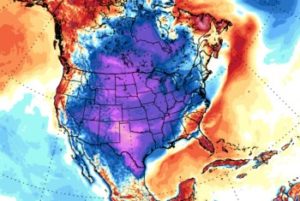by Cap Allon, April 16, 2020 in ClimateChangeDispatch
Record cold and snowfall hit many parts of North America over the Easter weekend, continuing what has so far been a largely Arctic April.
Records were toppled across many U.S. states, with Montana, Iowa, South Dakota, and Colorado seemingly worst hit.
A winter storm system moved through Iowa on Sunday delivering between three inches and a foot to the majority of locations — several northern Iowa towns saw all-time records tumble:
The 3.7 inches that fell at Sioux Gateway Airport broke the record for April 12th; it also made it the second-highest Easter snowfall ever behind the 4.7 inches during Easter 1929.
The town of Ringsted in Emmet County (also Iowa) came in with a record-busting 11 inches.
Robert “Lightning” Petersen was the man to log the accumulation — he uses his back yard measuring equipment to keep track of snow and rainfall. He works in concert with the National Weather Service out of Johnston.
…

by P. Homewood, April 16, 2020 In NotaLotofPeopleKnowThat
London, 16 April: The floods that affected northern England in the autumn of 2019 were nothing out of the ordinary. That’s according to a new review of the UK’s 2019 weather.
Author Paul Homewood says that although rainfall in the region was high, it has been exceeded several times in the past, right back to the 19th century.
…
Key findings
* After a rising trend between the 1980s and early 2000s, temperature trends have stabilised in the UK.
* Heatwaves are not becoming more intense, but extremely cold weather has become much less common.
* There is little in the way of long-term trends in rainfall in England and Wales.
* Sea-level rise around British coasts is not accelerating.
The UK’s Weather in 2019: More of the same, again (PDF)
by P. Homewood, April 16, 2020 in NotaLotofPeopleKnowThat
Melting glaciers in Norway have revealed ancient artefacts dropped by the side of a road more than 1,000 years ago.
Clothes, tools, equipment and animal bone have been found by a team at a lost mountain pass at Lendbreen in Norway’s mountainous region.
A haul of more than 100 artefacts at the site includes horseshoes, a wooden whisk, a walking stick, a wooden needle, a mitten and a small iron knife.
The team also found the frozen skull of an unlucky horse used to carry loads that did not make it over the ice.
The objects that were contained in ice reveal that the pass was used in the Iron Age, from around AD 300 until the 14th century.
Activity on the pass peaked around AD 1000 and declined after the black death in the 1300s, due as well to economic and climate factors.
The researchers say the melting of mountain glaciers due to climate change has revealed the historical objects, with many more to come.
https://www.dailymail.co.uk/sciencetech/article-8224817/Melting-ice-reveals-lost-Viking-mountain-path.html
Unfortunately neither the journalist nor the scientists seem to be capable of adding 2+2!
The existence of the Medieval Warm Period in Norway, followed by glacial advance in the Little Ice Age has been long known about, as HH Lamb wrote in 1982:
…
La géologie, une science plus que passionnante … et diverse

